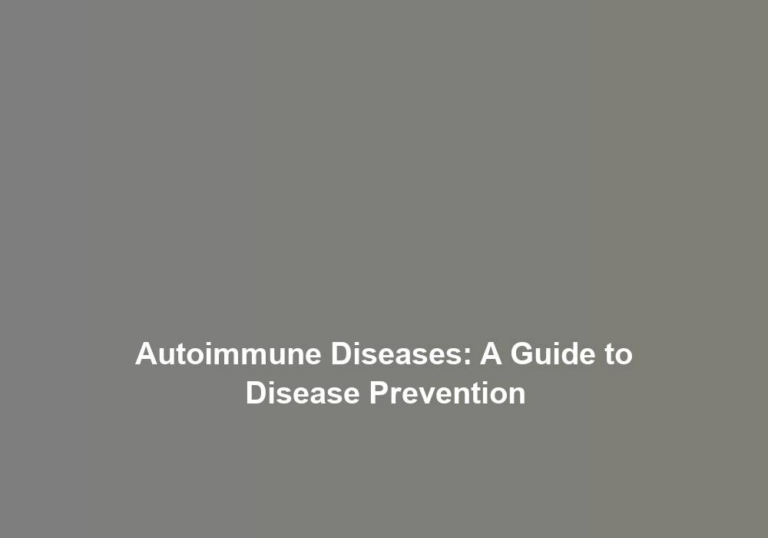Optimizing Autoimmune Health by Avoiding Inflammatory Foods
Have you ever felt like your body is constantly at war with itself? Autoimmune diseases can make it seem that way, as your immune system mistakenly attacks healthy cells. But thereG??s hope. By making some simple yet powerful changes to your diet, you can help calm the inflammation that fuels autoimmune conditions. Imagine having more control over your health and well-being simply by being mindful of what you eat. ItG??s not as daunting as it may seem, and the impact can be significant.
Understanding Autoimmune Diseases
Understanding autoimmune diseases can be complex, but it is essential for managing your health effectively. Autoimmune diseases occur when the immune system mistakenly attacks the bodyG??s own cells, tissues, and organs. This immune system dysfunction leads to inflammation, pain, and organ damage. There are over 80 known types of autoimmune diseases, including rheumatoid arthritis, lupus, celiac disease, and type 1 diabetes. Each autoimmune disease has unique symptoms and targets different organs or body systems.
The immune system is a complex network of cells, tissues, and organs that work together to defend the body against harmful invaders, such as viruses, bacteria, and other pathogens. In a healthy immune system, this defense mechanism is finely tuned to recognize and attack only foreign substances while leaving the bodyG??s own cells untouched. However, in autoimmune diseases, this balance is disrupted, leading to an overactive immune response against the body itself.
ItG??s important to recognize the signs and symptoms of autoimmune diseases, as they can vary widely and often overlap with other conditions. Common symptoms include fatigue, joint pain, fever, and a general feeling of malaise. By understanding the overview of autoimmune diseases and the underlying immune system dysfunction, you can be proactive in seeking medical attention and managing your health effectively. If you suspect you may have an autoimmune disease, it is crucial to consult with a healthcare professional for an accurate diagnosis and appropriate management plan.
Impact of Inflammatory Foods
If you suspect you may have an autoimmune disease, being mindful of the impact of inflammatory foods on your health can be a crucial step in managing your symptoms and overall well-being. Reducing inflammation through dietary adjustments can significantly influence your autoimmune health. HereG??s how you can make a positive impact on your well-being:
-
Identifying Inflammatory Foods: Start by identifying and eliminating common inflammatory foods such as refined sugars, processed foods, and trans fats. These foods can trigger an inflammatory response in the body, exacerbating autoimmune symptoms.
-
Incorporating Anti-Inflammatory Foods: Make a conscious effort to include anti-inflammatory foods in your diet, such as fatty fish rich in omega-3 fatty acids, colorful fruits and vegetables, nuts, seeds, and healthy fats like olive oil. These foods can help reduce inflammation and support your immune system.
-
Balancing Macronutrients: Aim for a well-balanced diet that includes healthy carbohydrates, lean proteins, and healthy fats. This balance can help regulate your blood sugar levels and reduce the overall inflammatory load on your body.
Common Inflammatory Triggers
You can start by understanding how certain foods can trigger inflammation in your body, especially if you have food sensitivities. ItG??s important to be aware of pro-inflammatory ingredients in processed and packaged foods that may exacerbate autoimmune symptoms. Additionally, exploring the connection between gut health and inflammation can provide valuable insights into managing autoimmune conditions.
Food Sensitivities
Identifying and managing common inflammatory triggers in your diet is essential for optimizing autoimmune health. When it comes to food sensitivities, itG??s crucial to understand which foods may be contributing to inflammation in your body. HereG??s what you need to know about managing food sensitivities:
- Eliminating Triggers:
- Work with a healthcare professional to identify potential trigger foods.
- Keep a food diary to track symptoms and potential food culprits.
- Gradually eliminate suspected trigger foods to gauge their impact on your health.
Understanding and addressing your food sensitivities can play a significant role in managing autoimmune conditions. By testing sensitivities and eliminating triggers, you can take proactive steps to minimize inflammation and support your overall well-being.
Pro-inflammatory Ingredients
Common inflammatory triggers, such as certain food ingredients, can exacerbate autoimmune conditions and contribute to ongoing inflammation in the body. Identifying pro-inflammatory ingredients is crucial for reducing inflammation through diet choices. Some common pro-inflammatory ingredients to watch out for include refined sugars, trans fats, vegetable oils high in omega-6 fatty acids (e.g., corn, sunflower, and soybean oil), refined carbohydrates, and excessive consumption of red meat. These ingredients have been linked to increased levels of inflammatory markers in the body. By avoiding or minimizing these ingredients in your diet, you can help reduce inflammation and potentially alleviate symptoms associated with autoimmune conditions. Opt for whole foods, such as fruits, vegetables, whole grains, lean proteins, and healthy fats like avocados and nuts, to support your bodyG??s natural anti-inflammatory processes.
Gut Health Connection
To promote optimal autoimmune health, itG??s important to recognize how the gut health connection influences the impact of common inflammatory triggers on the body. The gut-brain connection plays a crucial role in autoimmune health, as the gut microbiome balance can significantly affect the bodyG??s inflammatory response. Here are some key points to consider:
- Gut-Brain Connection: The communication between the gut and the brain can influence the bodyG??s immune response, potentially triggering or mitigating inflammation.
- The gut microbiota can produce neurotransmitters and neuroactive compounds that impact the immune system.
- Stress and emotions can affect gut permeability and microbiome balance, contributing to inflammation.
Understanding the interconnectedness of the gut and the immune system underscores the importance of maintaining a healthy gut microbiome for overall autoimmune health.
Building an Anti-Inflammatory Diet
Craft your daily meals with a focus on incorporating whole, unprocessed foods known to have anti-inflammatory properties, such as leafy greens, fatty fish, berries, and nuts. These foods are rich in antioxidants, omega-3 fatty acids, and other nutrients that can help reduce inflammation in the body. Meal prep and grocery shopping play a crucial role in building an anti-inflammatory diet. When you plan your meals and stock up on nutritious ingredients, youG??re more likely to stick to your dietary goals and avoid reaching for processed, inflammatory foods in moments of hunger or convenience.
Consider incorporating the following anti-inflammatory foods into your diet:
| Food Group | Examples | Benefits |
|---|---|---|
| Leafy Greens | Spinach, kale, arugula | Rich in vitamins, minerals, and phytochemicals that combat inflammation. |
| Fatty Fish | Salmon, mackerel, sardines | Excellent source of omega-3 fatty acids, known for their anti-inflammatory properties. |
| Berries | Blueberries, strawberries, raspberries | Packed with antioxidants, fiber, and flavonoids that help reduce inflammation. |
| Nuts | Almonds, walnuts, pistachios | Good source of healthy fats, fiber, and antioxidants with anti-inflammatory effects. |
| Olive Oil | Extra virgin olive oil | Contains oleocanthal, which has been shown to have similar anti-inflammatory effects as ibuprofen. |
Tips for Avoiding Inflammatory Foods
When it comes to avoiding inflammatory foods, a good place to start is by becoming proficient in reading food labels. This will help you identify ingredients that could trigger inflammation. Additionally, meal planning can help you stay on track and avoid impulsively reaching for foods that may exacerbate autoimmune symptoms.
Food Label Reading
Understanding how to interpret food labels is crucial for making informed choices to support your autoimmune health. When reading food labels, consider the following:
- Identifying Hidden Triggers:
- Look for common inflammatory ingredients like gluten, soy, and artificial additives.
- Check for hidden sugars such as high fructose corn syrup or dextrose.
- Be aware of potentially allergenic substances like dairy, nuts, or shellfish.
Meal Planning
After understanding how to interpret food labels to identify hidden triggers for your autoimmune health, the next step is to incorporate meal planning tips that help you avoid inflammatory foods and support your well-being. When meal planning, consider ingredient substitution to eliminate potential triggers. Opt for fresh, whole foods and avoid processed items. Prioritize grocery shopping with a list to stay focused and avoid impulse purchases of inflammatory foods. Practice portion control to prevent overconsumption of trigger foods, and strive for a balanced intake of nutrients to support your immune system. Plan meals that include a variety of fruits, vegetables, lean proteins, and healthy fats. By being mindful of ingredient choices, portion sizes, and nutrient balance, you can craft meals that nourish your body and reduce inflammation, ultimately supporting your autoimmune health.
Managing Autoimmune Health Through Diet
Optimize your autoimmune health through a carefully tailored diet that supports your bodyG??s natural healing processes and reduces inflammation. Making dietary modifications can significantly impact your autoimmune condition, helping to manage symptoms and improve overall well-being. Consider incorporating the following healing foods into your diet:
-
Anti-inflammatory Foods: Focus on consuming foods rich in omega-3 fatty acids, such as salmon, chia seeds, and walnuts. These foods can help reduce inflammation in the body, potentially alleviating symptoms associated with autoimmune conditions.
-
Nutrient-Dense Foods: Prioritize nutrient-dense foods like leafy greens, colorful vegetables, and fruits. These foods are packed with essential vitamins, minerals, and antioxidants that can support your immune system and aid in the healing process.
-
Probiotic-Rich Foods: Incorporate probiotic-rich foods like yogurt, kefir, and sauerkraut into your diet. Probiotics can help maintain a healthy balance of gut bacteria, which is crucial for immune function and overall health.
Conclusion
So next time youG??re at the grocery store, remember that choosing anti-inflammatory foods can be a powerful way to support your autoimmune health. ItG??s like building a fortress around your body, protecting it from the enemy of inflammation. By making small changes to your diet and avoiding inflammatory triggers, you can take control of your health and feel the benefits of a balanced and nourishing way of eating. Your body will thank you for it.







